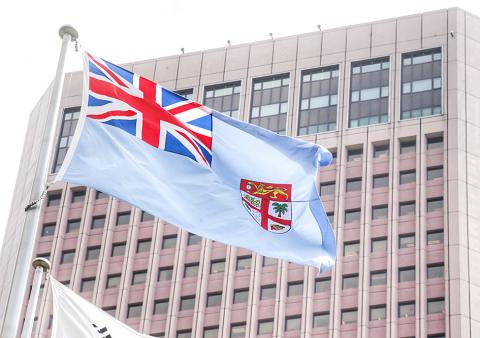Fiji has closed its representative office in Taipei to make better use of its resources and not because of pressure from China as one lawmaker has claimed, the Ministry of Foreign Affairs said yesterday.
The Fiji Trade and Tourism Representative Office was shut down on Wednesday last week after Fijian Representative to Taiwan Karaisitiani Vuibau notified the ministry of his nation’s decision to end its operations in Taiwan, ministry spokeswoman Eleanor Wang (王珮玲) said.
Despite the closure of Fiji’s office in Taipei, Taiwan’s representative office in Fiji would continue to operate, Wang said.

Photo: CNA
Fiji’s move was made to reallocate resources to better meet the nation’s needs, Wang said, adding that unofficial bilateral ties between the two nations would not be affected by the move.
The closure of the office was brought to light by Chinese Nationalist Party (KMT) Legislator Lu Hsiu-yen (盧秀燕) during a legislative committee meeting yesterday.
Lu said she learned that one of the reasons behind the closure of the office was an attempt by China — which maintains diplomatic relations with Fiji — to suppress Taiwan amid strained cross-strait relations.
However, Deputy Minister of Foreign Affairs Wu Chih-chung (吳志中) told the committee that it was believed that Fiji closed its office mainly due to its limited financial resources, forcing it to adjust the number of foreign missions it supports.
The ministry saw the closure as an isolated case that would not have a “domino effect,” Wu said.
The ministry provided administrative assistance to help Fijian officials close the office and they in turn expressed their gratitude to the ministry for its efforts to help advance bilateral ties over the years, Wang said.
Fiji set up its representative office in Taiwan in 1997, in an effort to advance trade, investment and tourism relations, after the nations signed a joint “mutual recognition” communique in 1996, the ministry said.
Taiwan set up a trade mission in Fiji in 1971, which was closed and replaced by the East Asia Trade Center in 1976, a year after China and Fiji established diplomatic ties.
The East Asia Trade Center was renamed the Trade Mission of the Republic of China (Taiwan) to the Republic of Fiji in 1988.

A preclearance service to facilitate entry for people traveling to select airports in Japan would be available from Thursday next week to Feb. 25 at Taiwan Taoyuan International Airport, Taoyuan International Airport Corp (TIAC) said on Tuesday. The service was first made available to Taiwanese travelers throughout the winter vacation of 2024 and during the Lunar New Year holiday. In addition to flights to the Japanese cities of Hakodate, Asahikawa, Akita, Sendai, Niigata, Okayama, Takamatsu, Kumamoto and Kagoshima, the service would be available to travelers to Kobe and Oita. The service can be accessed by passengers of 15 flight routes operated by

Chinese spouse and influencer Guan Guan’s (關關) residency permit has been revoked for repeatedly posting pro-China videos that threaten national security, the National Immigration Agency confirmed today. Guan Guan has said many controversial statements in her videos posted to Douyin (抖音), including “the red flag will soon be painted all over Taiwan” and “Taiwan is an inseparable part of China,” and expressing hope for expedited reunification. The agency last year received multiple reports alleging that Guan Guan had advocated for armed reunification. After verifying the reports, the agency last month issued a notice requiring her to appear and explain her actions. Guan

GIVE AND TAKE: Blood demand continues to rise each year, while fewer young donors are available due to the nation’s falling birthrate, a doctor said Blood donors can redeem points earned from donations to obtain limited edition Formosan black bear travel mugs, the Kaohsiung Blood Center said yesterday, as it announced a goal of stocking 20,000 units of blood prior to the Lunar New Year. The last month of the lunar year is National Blood Donation Month, when local centers seek to stockpile blood for use during the Lunar New Year holiday. The blood demand in southern Taiwan — including Tainan and Kaohsiung, as well as Chiayi, Pingtung, Penghu and Taitung counties — is about 2,000 units per day, the center said. The donation campaign aims to boost

The Central Weather Administration (CWA) said a magnitude 4.9 earthquake that struck off the coast of eastern Taiwan yesterday was an independent event and part of a stress-adjustment process. The earthquake occurred at 4:47pm, with its epicenter at sea about 45.4km south of Yilan County Hall at a depth of 5.9km, the CWA said. The quake's intensity, which gauges the actual effects of a temblor, was highest in several townships in Yilan and neighboring Hualien County, where it measured 4 on Taiwan's seven-tier intensity scale, the CWA said. Lin Po-yu (林柏佑), a division chief at the CWA's Seismological Center, told a news conference